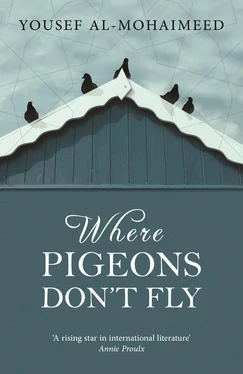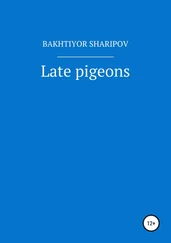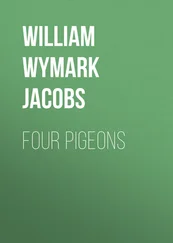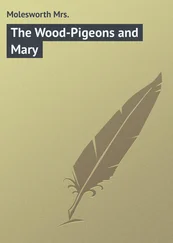From beside them Fahd suddenly asked, ‘Who are you to decide if we need it or not? Did you lot need to flog her to death?’
Yasser, the honorary doctor, waved his hands frantically in the face of his angry, grief-stricken cousin as he tried to explain that according to tests and X-rays her death had been inevitable.
‘The disease had spread to her lungs and there was no hope of recovery so we tried curing her with the Qur’an. We’d heard that God had cured many people through traditional Islamic healing.’
The senior detective remarked that there had been a similar case two days previously in Dawadmi. The victim had been a ten-year-old boy who was beaten to death. He mentioned that there were many cases of people being tortured to exorcise jinn and demons.
As the three of them stood in the passage opposite the curtained-off beds, Abu Ayoub came over and stated that the best way to honour the dead was burial. Death was a part of life, he said: Umm Fahd’s death had been decreed and might atone for her sins, for a Muslim’s suffering on earth shall ease the torment they face in the afterlife. The senior detective was nodding in agreement. Abu Ayoub went on: the autopsy would delay the burial and complicate matters for the relatives who would be arriving tomorrow afternoon, travelling from outside Riyadh to pray over her.
Glancing at his father out of the corner of his eye, Yasser completed the thought: wouldn’t withdrawing the case make it unnecessary for the deceased to go to the dissection table and mean she could be put straight in a fridge?
Fahd objected. ‘Am I going to withdraw a murder charge? And whose murder? My own mother’s! I will not.’
Fahd dripped sweat and rage, the events of his mother’s final days streaming past his eyes like some endless film reel.
He remembered his mother a month before, telling him the story of his father’s eldest sister, Haila, a tale she had heard a number of times from Suleiman. She’d never forgotten it: how Haila had died fifty years before out in Wadi al-Rawghani near Unayza; how the girl’s father had fasted for two successive months in penance for manslaughter, or neglect of a ten-year-old child.
Haila had started experiencing frequent headaches. She took to supporting herself against walls as she walked and dragging her feet. The world around her gradually faded and bit by bit the light went out. The traditional remedies and cures offered by a woman called Moudi in Sabakh didn’t help; her attempts to cure Haila’s dizzy spells and loss of sight were fruitless.
Suleiman had never known his sister — he was not yet born when she died — but he could picture her perfectly from his mother’s description: a beautiful, pale-skinned child with two pigtails hanging down her back, a parting that gleamed like lightening and wide eyes with a singular gleam. When she laughed her white teeth showed and she smiled with the watchfulness of a twenty-year-old, though younger by far. She relieved her mother of many of the household duties.
Her father returned after sunset prayers and told his wife that the imam from the mosque in Jurida would come to blow on her. The sheikh came twice and in a loud hoarse voice recited, ‘“By the star when it goes down, your companion is neither astray nor is he misled,”’ then blew out forcefully from his mouth until the young girl, fed up, covered her face with a black shawl. She was disgusted now, trying to keep her covered face away from him, so he wrenched her face in his direction and recited in something like a scream, ‘Say: It has been revealed to me that a company of jinn paid heed …’
‘Enough!’ Haila said more than once, holding out her hand like someone trying to ward off harm.
Afterwards, going out to the front door with her father, the sheikh decreed that she was possessed, which is how the father came to burn a thumb-sized twist of the black shawl over the spirit stove then puffed on the catching flame. As soon as the white smoke coiled up from the glowing fabric he inserted it into Haila’s nose. She cried out at the touch of the searing ember and almost gave up the ghost, pinned down by her mother’s arms until both tiny white nostrils had been transformed into something resembling a stovepipe, rimmed with black and open sores.
A few days later her father and his wife drove the old red Ford south out of Buraida, carrying the blinded, woozy child with them. The road to Unayza was unforgiving and rough, the vehicle lifting and dipping through the potholes. Near Urouq al-Nafoud they had to dig and tamp around tyres that had stuck in the soft red sand. At last they reached Wadi al-Rawghani and breathed a sigh of relief.
It was night and exhaustion had left them drowsy as the dead. There were tents for hire in the wadi but the father stopped the car and got out, dragging the box of tea and coffee-making implements from the boot. Opening the wooden crate he took out a long-stemmed brass coffee pot and hunted in the dark for matches and a scrap of cloth which he stuffed in the spout. He took a match from the box marked Abu Shuala and illuminated the darkness with a small flame set at the wick of the spirit stove, which immediately gave off a smell of gas. The father needed to set his head straight with a cup of bitter coffee before he slept. In the Ford’s cabin nothing disturbed the sound of the mother’s snoring save an occasional wail from Haila.
One still summer’s night, a few days before her death, Fahd’s grandmother revealed that she had put snuff in the water and made Haila take seven swallows in a row. On the third day of living in the tent and being treated with the dusty-smelling snuff, in the early morning while her father was out negotiating with some men about buying a cow, Haila died in her mother’s arms.
Having purchased the cow and tied it to a tent peg the father returned and went in to see his wife. They washed their little girl’s body, placed her in a coffin and said the afternoon prayer over her with the other worshippers, then they buried her in the Taeemiya cemetery outside Unayza. Father and mother returned to town with their cow. When his grandmother told this story, she felt a rage and bitterness that robbed her of her voice as it had done every time she had told it over the past fifty years.
Had Soha died the same way? Haila had died at the hands of a sheikh in Wadi al-Rawghani and now Soha had perished at the hands of an Egyptian sheikh. Back then, his grandfather had paid penance for his sin, an admission of guilt, but Fahd’s uncle and cousin avoided taking responsibility for killing Umm Fahd. In their eyes they had used their initiative after modern medicine had been unable to cure her.
‘Dear God! Had mother ever imagined for a second that she would die one day beaten with a stick and unable to breathe, drowned by drinking water until she vomited? Can it be that science and the study of medicine have had no effect on my cousin with his big, close-set eyes, like an owl lurking in the dark?’
Yasser withdrew from the heated argument, rapidly punched the buttons on his mobile phone and conversed in a low voice. The senior detective was explaining that the right of Soha’s descendants to withdraw their case was their right as individuals, but that the state’s right to pursue the charge remained with the police. In other words, the Egyptian sheikh would not escape punishment just because they withdrew their accusations.
Fahd insisted that he would never back down where his mother’s rights were concerned and he would sign nothing to that effect. Abu Ayoub returned to the subject of fate and how Fahd didn’t believe in it—‘My brother, fear your Lord’—as though laying the ground to accuse his nephew of being a secularist, an infidel and an atheist.
Читать дальше












